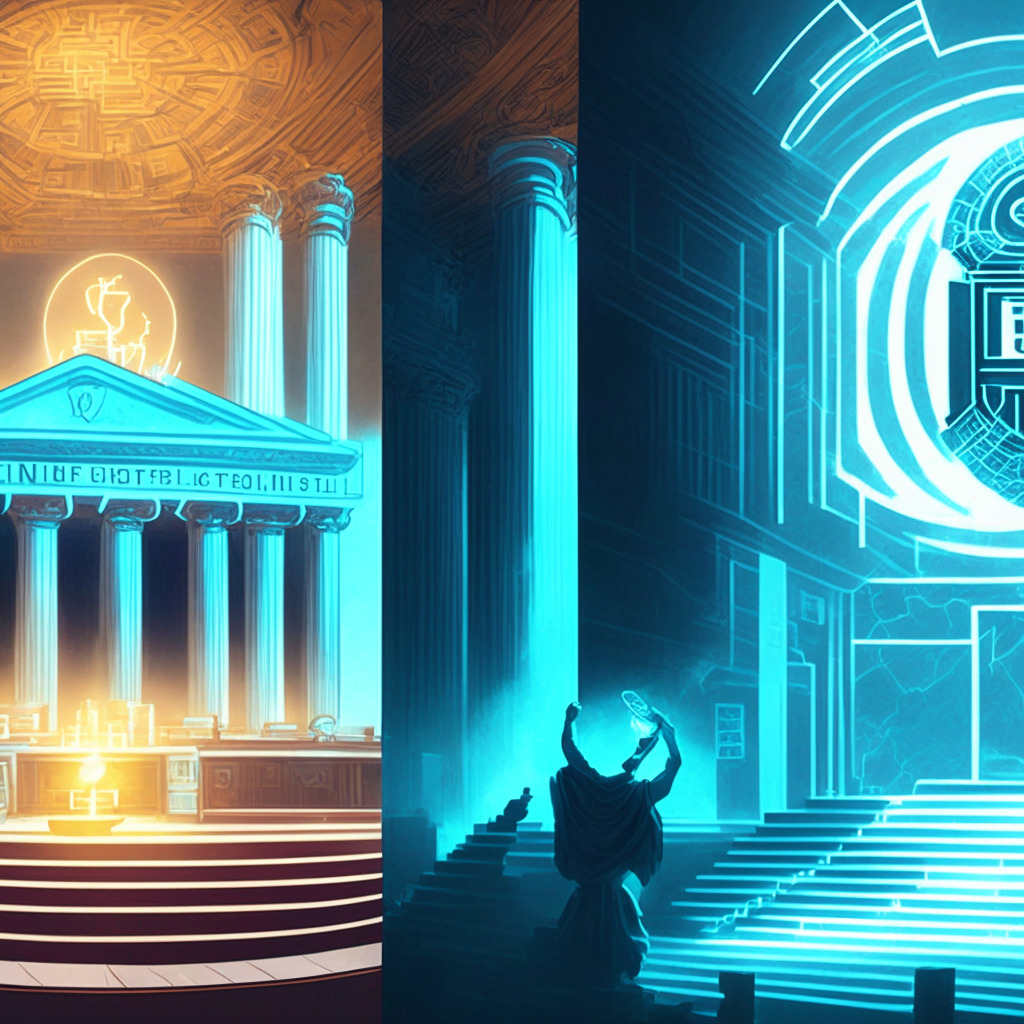“The director of the Consumer Financial Protection Bureau, Rohit Chopra, recently shared that the bureau is contemplating applying the Electronic Fund Transfer Act (EFTA) to digital assets. This approach could minimize high losses often experienced from unauthorized crypto transactions and aim to establish safer environment for investors.”
Search Results for: Applied Digital
Sygnum Singapore’s Digital Breakthrough: Unpacking the Pros and Cons of Singapore’s Sieve-Like Crypto Compliance
Sygnum Singapore, a subsidiary of the Swiss-based crypto bank, has secured its Major Payment Institution License from the Monetary Authority of Singapore. The license enables Sygnum to provide regulated digital payment token brokerage services, breaking previous transaction limits, and paving the way for potential expansion into Asia-Pacific markets.
The Digital Ruble: A Splash in the Global Financial Landscape or Russia’s Field to Plow?
“Russia’s Central Bank Digital Currency (CBDC) – the digital ruble – can play a significant role in curbing black market dollar trading, says former government official, Sergei Kalashnikov. It could minimize the chance of official currency entering the black market, adjust ruble’s value and impact dollar’s growth against it.”
Blockchain Revolution: A Bold New Redefinition of Money for the Digital Age
“The advent of Bitcoin and other cryptocurrencies challenges the traditional concept of money, prompting a reevaluation of its definition and function in the digital world. Long resistant institutions are questioning the essence of money as blockchain-driven innovation requires an evolution in thought.”
Deutsche Bank Goes Crypto: Exploring Their Move into Digital Asset Custody and Its Implications
Deutsche Bank, Germany’s largest banking institution, has applied for a digital asset custody license with BaFin, aiming to expand its digital asset custody services, including cryptocurrencies. This marks a shift from the bank’s previous critical stance toward the volatile and unpredictable crypto market.
Hong Kong’s Crypto Dilemma: Striving for a Digital Asset Hub Amid Regulatory Uncertainties
Hong Kong’s new regulatory framework for cryptocurrencies prioritizes investor protection and aims to establish the city as a leading digital-asset hub. However, the crypto industry expresses caution over the costs and complexities of adhering to strict rules, and future challenges are anticipated.
Crypto Exchange OKX Expands to France: Adoption, Jobs, and Future of Digital Assets
Cryptocurrency exchange OKX plans to establish operations in France and hire 100 full-time employees over three years. The exchange has applied for Digital Asset Service Provider (DASP) registration, joining over 70 approved DASPs in the country, including Bitstamp and Societe Generale Forge.
Digital Pound: Navigating New Legislation, Privacy, and AML Regulations for CBDC Adoption
The introduction of a digital pound in the U.K. requires new legislation defining its characteristics and amendments to current data, privacy, and anti-money laundering regulations. The Treasury and Bank of England are currently seeking public feedback on its design while developing its policy and technology aspects. The legal framework should address ownership, security, and ensure privacy while protecting citizens from fraud.
Debating Anonymity in Digital Pounds: CBDCs vs Cryptocurrencies in the UK
At a recent Financial Times Cryptocurrency and Digital Assets Summit, Tom Mutton, the Bank of England’s head of fintech, discussed the UK’s plans for a central bank digital currency (CBDC) focusing on privacy and anonymity. While emphasizing privacy, Mutton stated that anonymity would not be intended for the digital pound and it would not be interoperable with cryptocurrencies. The Bank of England’s approach raises questions on the role of anonymity, privacy, and interoperability in the financial ecosystem.
Kenya’s Finance Bill 2023: Digital Asset Tax Debate and its Impact on Crypto Community
Kenya’s Finance Bill 2023 proposes a 3% tax on digital assets, including cryptocurrencies and NFTs, and a 15% tax on online content monetization. While some view this as official recognition of digital assets in Kenya, others argue it amounts to targeted harassment, with advocacy group Cryptocurrency Kenya calling for universal application of digital taxes.
Nvidia’s Q2 Earnings Ripple Effect: A Brighter Future for AI-related Crypto Tokens or False Dawn?
Nvidia’s Q2 earnings outpaced analyst predictions, triggering a growth in NVDA stocks and sparking interest in AI-related crypto tokens like Fetch.ai, The Graph, and SingularityNET. Companies like Applied Digital and Hive are shifting operations to support AI, hinting a promising future for AI-focused cryptocurrencies.
Crypto Miners Diversifying into AI: Defensive Move or the Next Big Strategy?
“Crypto miners may expand into AI due to their shared requirement for high-end computer chips. Given the chip shortage, such diversification could be beneficial. For example, Applied Digital and Iris Energy are moving into AI cloud computing and high-performance computing data centers, respectively. This would reduce dependence on Bitcoin’s volatile price.”
Supercalculating the Future: AI, Blockchain, and the Surprising Resilience of Bitcoin Miners
Applied Digital Corporation (APLD) notably ventured into AI as its third business initiative, gaining attention for its strategic partnership with Hewlett Packard Enterprises (HEP) for the use of HPE Cray XD supercomputers. This partnership hopes to enhance APLD’s AI cloud service, potentially generating around $820 million over the next three years and compensating for the decrease in bitcoin prices.
Crypto Miners Venturing into AI and Cloud Computing: Opportunities and Challenges Ahead
Crypto miner Applied Digital ventures into AI and cloud computing, signing a deal to host AI cloud computing loads in its data centers, potentially earning $460 million over 36 months. This move reflects an increasing trend of crypto miners seeking alternative revenue streams amid competitive market conditions.
Navigating the Future of Blockchain with AI: A Gate to Web3 or a Complex Tech Conundrum?
“Hive Blockchain shifts its focus to artificial intelligence as Hive Digital Technologies, while remaining committed to Bitcoin and crypto mining. The company envisions AI and blockchain jointly promoting the development of Web3, potentially enhancing user privacy and data ownership.”
Exploring the Fusion of AI and Bitcoin Mining: Opportunities and Hurdles in High-Performance Computing
Iris Energy aims to integrate high-performance computing with bitcoin mining, in line with the growing interest in AI. The AI-driven data center space is predicted to grow to $76 billion by 2028, and companies like Iris Energy see potential in combining these technology domains despite the challenges they may face.
Crypto Regulation vs Innovation: DoJ Case & France’s CBDC Vision Unveil the Blockchain Dichotomy
“DoJ asserts that absence of specific US crypto regulation does not invalidate criminal charges against Sam Bankman-Fried, former FTX CEO. Existing laws against misappropriation of customer assets still apply. This situation highlights imbalances in current crypto regulations, where extant laws can yield harsh punitive consequences in new situations.”
The Rain of Tokens: How Optimism’s 3rd Airdrop Fosters Blockchain Community Participation
“Layer 2 network Optimism launched a third airdrop of OP tokens, distributing 19.4 million tokens to over 31,000 wallets. The airdrop aimed to boost community involvement in the Optimism Collective’s delegation activity and to encourage users to vote in governance.”
Hong Kong’s SFC to Publicly List Licensed Cryptocurrency Exchanges: A Step Towards Transparency
Hong Kong’s Securities and Futures Commission (SFC) plans to publish a list of cryptocurrency trading companies that have applied for operational licenses, bringing transparency to the industry. Nevertheless, this doesn’t guarantee rule conformity. This follows a major financial scam involving unlicensed cryptocurrency exchange JPEX which reportedly caused significant losses for investors. The SFC emphasizes strict governance measures including asset safety and market manipulation prevention to ensure investor protection.
Political Pressure Meets Blockchain: The Shifting Sands of UK’s Crypto Regulatory Landscape
“Former FCA chairman Charles Randell discusses alleged political influence on UK regulatory bodies to adopt cryptocurrency companies. While some see these pressures as compromising, they may catalyze the safe adoption of emerging technologies like cryptocurrency within custom-built frameworks for the digital asset sector.”
Hong Kong’s FinTech Watchdogs Clamp Down on Misleading Crypto Terminology
“Hong Kong Monetary Authority (HKMA) warned crypto companies against implying they fall under its regulation by misusing the term ‘bank.’ HKMA clarified, only licensed entities can offer banking services under the Banking Ordinance. The warning coincides with critique towards crypto platform JPEX from the Hong Kong Securities and Futures Commission for similar misrepresentations.”
Cryptocurrency’s Bold Advances & Legal Challenges: Analyzing Deutsche Bank, South Korean Bitcoin Lenders, EY.ai & More
“Deutsche Bank collaborates with Taurus, providing custody services for clients’ cryptocurrencies and tokenized assets. Meanwhile, Delio, a South Korean Bitcoin lender, contests fraud and embezzlement allegations, exposing lack of clear virtual asset regulations. Also, Ernst & Young unveils AI platform, and Mauve, a Decentralized Exchange, launches its operations.”
Unraveling the Regulatory and Ethical Quagmires: Navigating through the Crypto Landscape
A U.S. federal judge delayed a sentencing hearing for radio host Ian Freeman, who allegedly created an illegal Bitcoin exchange used by scammers. Meanwhile, the DeFi Education Fund contests a patent claim by tech company True Return Systems. Also, DigiFT’s dETH0924 provides up to 4% APR, boosting Ethereum’s PoS mechanism, while crypto infrastructure provider Qredo integrated Circle’s USDC stablecoin into its wallet.
Future of Blockchain: Unleashing Potential or Envisioning Pitfalls?
“Proponents of blockchain argue its security, transparency, and decentralization can revolutionize industries, and assert its potential is heightened by smart contracts. However, skeptics question scalability, high energy consumption, privacy implications, and complex technical knowledge. The future of blockchain lies in addressing these pitfalls, understanding its potential, and sound market operations.”
Lido Finance and the ERC-20 Security Flaw: Navigating Uncertain Waters in Crypto Safety
Despite a known security flaw in its token contract, Ethereum staking protocol Lido Finance ensures the safety of Lido DAO (LDO) and staked-Ether (stETH) tokens. The flaw reportedly allows “fake deposit” attacks, deviating from the usual Ethereum standards. The issue arises when a transfer’s value exceeds user holdings, generating a false positive rather than stopping the transaction. While this brings uncertainty, it’s a reminder for thorough testing before integrating new tokens.
Navigating MiCA: The EU’s Attempt at Blockchain Regulation and Its Impact on Crypto
The MiCA guidelines in the EU propose stricter regulations for crypto service providers and clampdown on market manipulation. However, they lack consideration for decentralized finance and central bank digital currencies. Moreover, they enforce a low reporting threshold eroding privacy rights, and require official approval for launching tokens, potentially inhibiting the development of new projects.
Unmasking the Grayscale vs SEC Drama: A Testament to Crypto’s Regulatory Tug-of-War
Grayscale, a Digital Asset Management firm, recently won a significant case against the Securities and Exchange Commission (SEC), paving the way for regulatory clarity within the crypto industry. This case highlighted the ongoing battle between innovation and regulation in the crypto market space.
Deciphering Blockchain: A Dive into Decentralization, Potential Pitfalls, and Future Acceptance
“Blockchain and cryptocurrencies possess transformative potential for sectors including finance and healthcare, offering advantages like security, speed, lower costs and decentralization. However, they also present challenges: they’re prone to volatility and perceived as potential safe-havens for illicit activities, and may even require centralized regulation for mainstream acceptance.”
Crypto’s Promise and Peril: Emerging Economies Face Financial Risks from Unregulated Cryptocurrencies
“Cryptocurrencies could potentially elevate financial risks in less developed economies, warns a study by the Bank for International Settlements (BIS). Emerging economies could face prohibitive legislation, pushing crypto activities into obscurity and bringing potential market risks.”
Unraveling Crypto Flash Crashes: A Cross-Disciplinary Approach to Understanding Market Anomalies
“The Luna flash crash of May 2022 marked a significant event in cryptocurrency research. Particle physics methods were applied to understand the crash’s inner workings, revealing widespread instances of spoofing and layering in the market. This cross-disciplinary approach unveiled a new method for understanding cryptocurrency crashes and market structures, offering potential for greater transparency and stability.”
Side-Channel Attacks on Crypto Wallets: The New Security Predicament in Blockchain Industry
Side-channel attacks on cryptocurrency hardware wallets are a rising threat. These attacks exploit unintentional leakage of information due to power consumption, electromagnetic emissions, or timing variations. Mitigation strategies include secure hardware design, cryptographic countermeasures, software mitigations, protection against power and timing analysis, and continuous monitoring.































